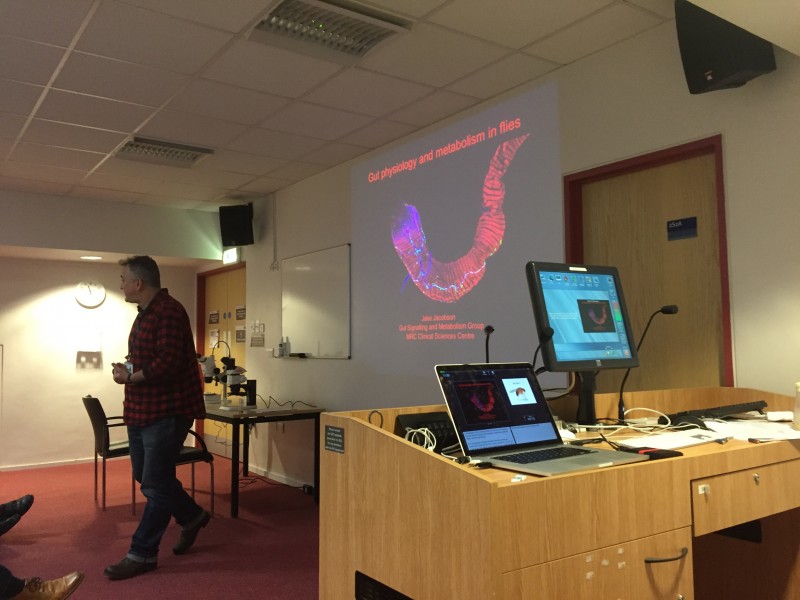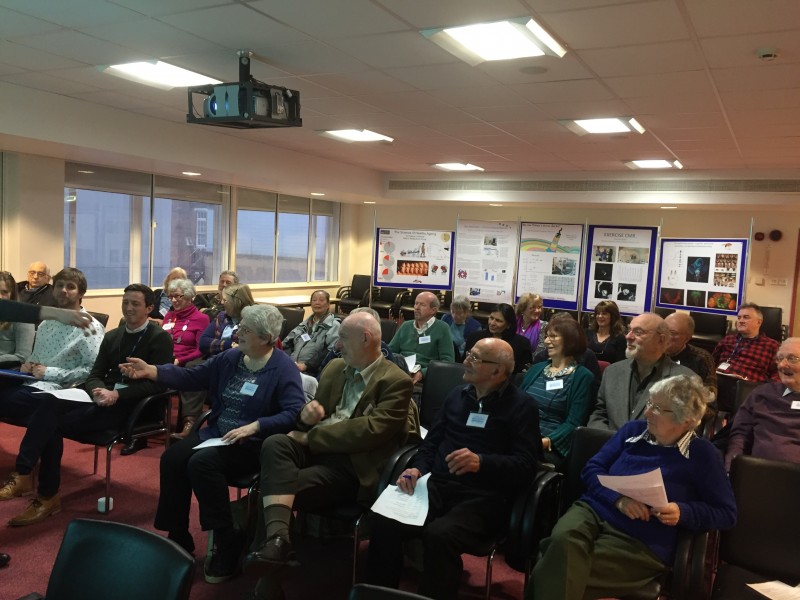By Helen Figueira
April 1, 2016
Time to read: 4 minutes
Susan Watts
“It’s a wonderful pleasure to acquire knowledge,” Fred Mitzman declared after his recent trip to the CSC. He’d been instrumental in organising the visit for himself and fellow students of the Harrow branch of the University of the Third Age.
“Knowledge is a wonderful attribute. I think acquiring it means to me more than anything else. I’m 88 years young, and I have so little time left. The amazing improvements in our lifestyle due to progress in science and medical health improvements are really available to everybody.”
The 27-strong group enjoyed a morning of talks from five CSC scientists. Bertie Gyenes spoke on “The Things a Worm Can Do”, describing two ways that a nematode worm can reverse, and what that might tell us about how our own brains control behaviour. Shareen Jaijee’s talk on “How Our Hearts react to Exercise”, described unique work at the CSC using exercise CMR (Cardiac Magnetic Resonance imaging) to study how the heart responds under stress.
“We take pictures of the heart while the subject is exercising. This looks like it might be straightforward, however it’s actually quite challenging. We have to take into account that the subject’s heart is moving and that their diaphragm is moving – because we can’t ask them to hold their breath while they’re exercising. We are currently the only place in the UK that is doing adult exercise CMR. Great Ormond Street hospital is doing it in children.”
Jake Jacobson’s talk on “Gut Physiology and metabolism in flies” explained why the fly is such a valuable model for understanding human brain-gut signalling, and in her talk on “What flies can tell us about ageing” Helena Cocheme described research on links between metabolic pathways and ageing processes, including the latest on clinical trials to explore this.

Peter Faull drew the morning to a close, with a talk on the history of mass spectrometry and its current uses in “Mass spectrometry, a tool for exploring molecules”. The audience raised a number of thought-provoking questions and thoroughly appreciated the time the speaker’s spent with them.
“I was very interested in the spectral photometry, and also in the idea of genes being able to have such an influence on ageing,” Mr Mitzman commented. “There’s a possibility that the more knowledge we have, the more we can age yet still appreciate life.”
“I was particularly impressed by the details about the worms,” said Anne Gerrard, co-organiser of the visit. “I hadn’t realised how closely we’re connected at a DNA level, and therefore how much can be extrapolated from research with them and then applied to the human condition. That was really fascinating.”
“It was the best morning I’ve had for ages,” Marna Hawkins said over lunch. She said she’d loved all of the talks, and intends to encourage her 12-year-old grandson to stick with science at GCSE as a result. “Being a medical person myself, who’s been retired for many years, it’s been fascinating to see what’s going on in the field of research today and also the potential that’s being applied to many problems of health such as obesity, diabetes and Alzheimer’s in an ageing population.”
Ruth Webber quietly revealed that she’d never managed to successfully see anything down a microscope at school. With Bertie Gyenes’ help she was fascinated to focus in on both the worms and the flies that were on show after the talks for those who wanted to know more.

For further information, contact:
Deborah Oakley
Science Communications Officer
MRC Clinical Sciences Centre
Du Cane Road
London W12 0NN
T: 0208 383 3791
M: 07711 016942
E: